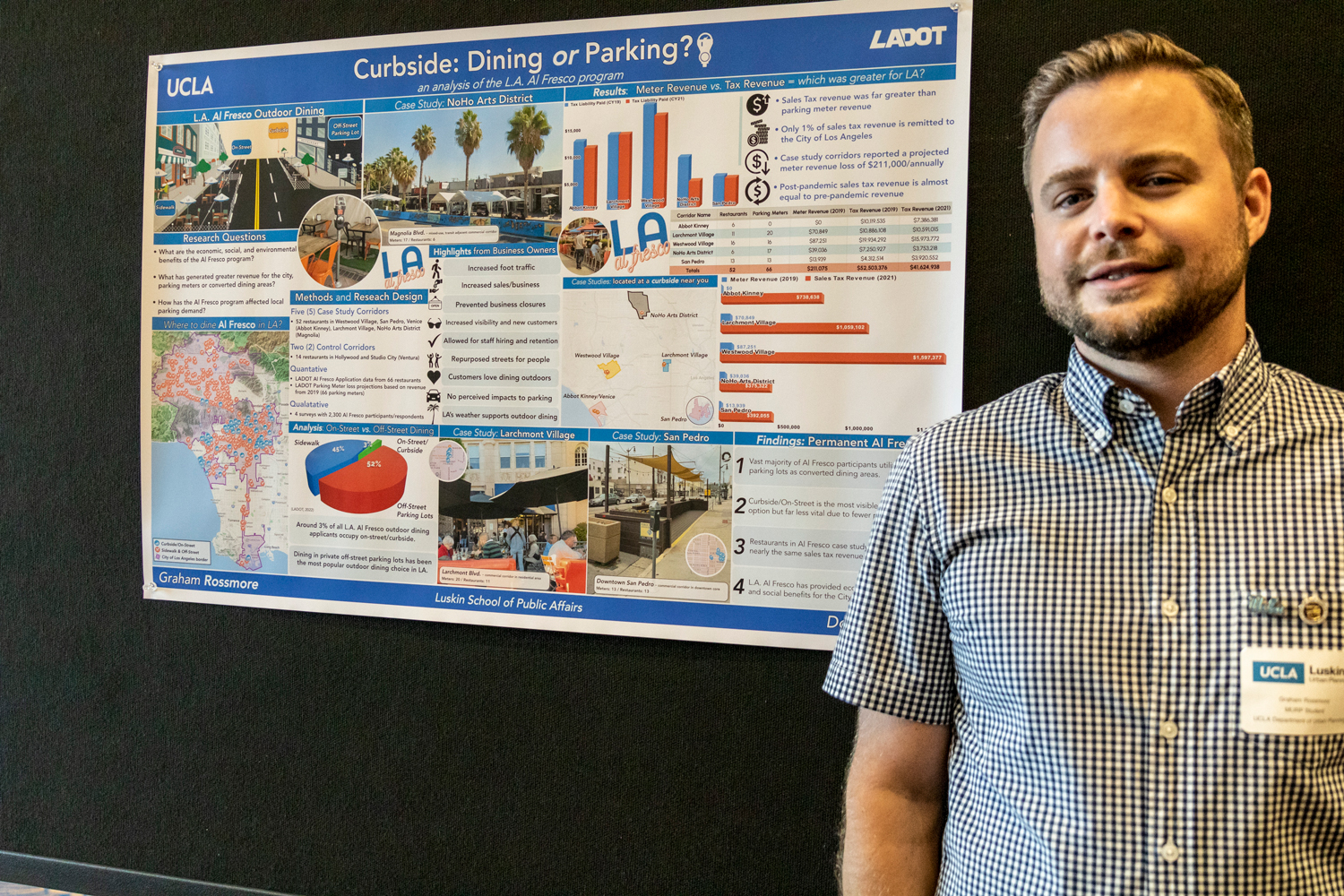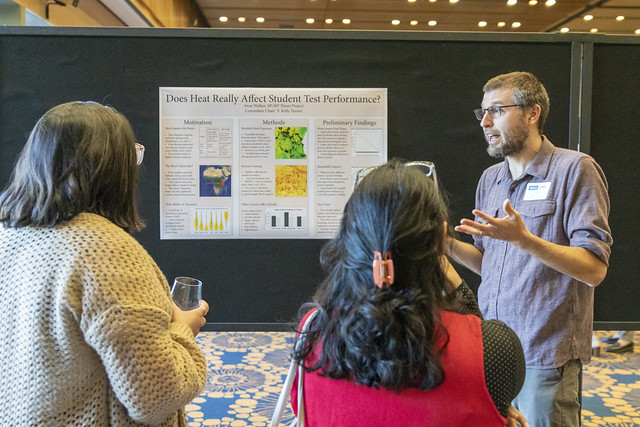By Les Dunseith
In recent months, UCLA Luskin graduate Graham Rossmore has become a go-to expert for Los Angeles officials who are studying the economic pros and cons of continuing the al fresco dining that sprang up during the COVID-19 pandemic.
Does the economic benefit of allowing outdoor dining on public property outweigh a loss of revenue from, say, parking meters?
Rossmore received his master’s degree in urban planning in June 2023, and he dove deep into that question and a host of related ones as part of his capstone project at UCLA Luskin. He found that, indeed, continuing outdoor dining would outweigh a loss of various revenue sources — along with a whole bunch of other benefits.
“Al fresco encourages more people walking, or people choosing to take alternative modes of transportation — and enjoying their neighborhoods,” Rossmore said.
Throughout UCLA Luskin, capstone projects like those in Urban Planning offer a chance for soon-to-graduate students to wrap up their UCLA education with a monthslong examination of a timely public policy issue. While student researchers often work with local government agencies as their clients, few have the opportunity to influence citywide policy decisions immediately. But that’s what happened for Rossmore.
An American born in Canada, Rossmore lived without a car for much of his 15 years in California. Perhaps not surprisingly, then, he began his urban planning studies with a focus on rail and bus transportation — which led him to a course taught by Donald Shoup, the distinguished research professor at UCLA Luskin who is perhaps the world’s foremost expert on parking.
“For whatever reason, parking policy speaks to me,” Rossmore said.
Shoup’s class gave Rossmore the opportunity to explore whether cities should continue what had begun as a temporary COVID-19 response — converting outdoor public spaces into al fresco dining spots. He focused on the Rustic Canyon neighborhood of Pacific Palisades, where he lived at the time.
The number of off-street parking lots there outnumbered restaurants, and when restaurants converted some of that parking into al fresco dining, they took it seriously.
“They spent a lot of money,” Rossmore said. “They have lights. They have fixtures. They’ve got heating. They’ve got seats.” He said some restaurant owners he interviewed in spring 2022 told him they had doubled their sales and expanded their customer bases.
A summer internship followed with the office of Los Angeles City Councilman Paul Krekorian, who is now council president. One connection led to another, and Rossmore soon found himself working part time on the city’s Al Fresco Dining program in the parking meters division of the Los Angeles Department of Transportation.

Rossmore and other students pursuing master’s degrees in urban planning present their capstone research findings during a poster session each year. Photo by Les Dunseith
The project helped inform his capstone project, and vice versa. He learned the ins and outs of sales tax, of which 99% goes to the state, while typically 1% is remitted to the city. Yet Rossmore found that the al fresco dining generated enough tax revenue to offset lost revenue from parking meters.
During presentations to LADOT leaders and city officials, Rossmore has highlighted many of the broader benefits of al fresco dining for local municipalities: Greater sales tax revenue represents higher overall economic output, which means happier business owners, customers and city officials.
He also discovered another plus of outdoor dining: More residents tend to eat closer to where they live, which brings all the benefits associated with reduced vehicle use.
“And when we take away parking spots, restaurants haven’t reported a lack of customers or people coming in and complaining, ‘I don’t dine here anymore because I can’t park,’” Rossmore said.
Rossmore’s capstone report analyzes three formats for al fresco dining — on sidewalks, on streets in formerly metered spaces and in private lots — each of which entails its own regulatory considerations. Sidewalk dining, for example, falls under the purview of the Department of Building and Safety because of the need to meet safety codes and comply with the Americans with Disabilities Act.
On-street dining is the focus of LADOT’s roadway dining initiative, and an LADOT report that cited Rossmore’s findings was sent to the Los Angeles City Council, recommending that businesses be allowed to offer curbside al fresco dining, so long as they pay a fee that would help offset lost parking revenue.
Even with his capstone project complete, Rossmore, who also serves on the Los Feliz Neighborhood Council, has continued researching the subject. He has also analyzed the costs and benefits of al fresco dining in several other corridors — Larchmont Village, San Pedro, Westwood Village, the NoHo Arts District in North Hollywood and Venice’s Abbot Kinney Boulevard.
“The sales tax in 2022 in most of these corridors is almost double pre-pandemic levels,” said Rossmore, noting that other parts of the city that lack al fresco dining, like Hollywood and Studio City, are collecting significantly less sales tax revenue than they were before COVID-19. “That suggests that the al fresco program not only was successful in keeping the businesses afloat — so that they didn’t close during the pandemic — but it also increased sales tax for the city and generated more profit for the restaurants overall.”
Rossmore also was asked to present his capstone research to officials at the Department of City Planning, which is developing the ordinance for outdoor dining in private, off-street parking lots. On April 27, he presented findings that only around 3% of al fresco dining was in on-street metered spaces.
“My client and I were able to speak at the public hearing and to demonstrate how off-street dining is the lion’s share of the program,” Rossmore said.
Soon after, the City Planning Commission issued a letter of determination to create a path for businesses to make outdoor dining a permanent feature. And the city’s chief executive has weighed in.
“Al fresco shows us a better way that supports small businesses, creates jobs and adds vibrancy to our neighborhoods,” Mayor Karen Bass said in a statement. “I directed city departments to work together to make this a permanent al fresco program that incorporates everything that made the temporary program successful and to make the process simple and easy to navigate for our restaurants.”
Two years ago, Graham Rossmore had no inkling he’d find himself telling city officials why it makes sense to convert public spaces into outdoor dining spots.
“In my personal statement to get into UCLA Luskin, I didn’t say, ‘Leaving this program, I’m going to be a parking expert,’” he said with a smile of satisfaction. “But that’s where I’ve ended up.”
View additional photos from Careers, Capstones and Conversation, a showcase of each year’s individual urban planning projects



